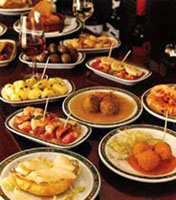
They say English is sweeping the globe. It’s not sweeping very hard in Spain. Outside of David Beckham’s house there’s precious little of it to be heard around here. Even the tourists speak mostly Euro-languages, which may explain why people at the train station information desks just shake their heads and wave you away when you say “Habla Ingles?” (Maybe that means, “Got a pencil?”)
Well, good for them. Pain in the ass for me, but good for them. These are the Spanish after all, originators of the world’s most romantic tongue and a colonial butt-kickers in their own right. They don’t need no stinking international language of business. It’s like the Amish say about their fellow Americans: Watch out for them English.
There was a story in the paper this week that made the point. Back in 1999, Ford Motor Company bought out Swedish automaker Volvo, those paragons of automotive safety. Now Ford and Volvo are involved in a dispute because Ford wants Volvo to relax. Volvo mandates a tough standard for roof strength, the better to protect occupants during rollovers. In internal memos disclosed to the New York Times, Ford scolded the Swedes, saying that since Volvo can’t absolutely prove strong roofs save lives (Ford maintains people are probably dead before the roof collapses), Volvo should ease up and make weaker, cheaper roofs, just like their new American masters.
That’s what happens when you mess with them English. You keep fighting, Spain.
Tapa or not tapa?
Meantime though, my personal misunderstandings persist — for example, my attempt to eat tapas, the small tantalizing dishes for which Spain is famous. On my first day in Seville, I went to a restaurant around 4:30 PM and tried to order from the tapas menu. The waitress shook her head — not now, pal. Larger meals only. Next evening around 10:30, different spot, another try. Another rebuff. No tapas now. Something larger for you?
Finally one early afternoon on a popular Seville avenue I chose a charming patio spot displaying two chalkboards, each chalkboard with a list of specials below the painted heading: “Tapas!”
I placed an order. The waiter shook his head. No tapas. When is tapas served, I asked?
He shook his head. No.
You mean, never?
He nodded. Nunca — never. No tapas, anytime.
I guess the chalkboards are sold in bulk.
Chime right in
There are other ways to communicate. Bells, for instance. They love their bells here — I suspect there are bells to announce three minutes till the next bell. I’ve heard a furious clamouring of bells at roughly 7:45 PM and bells that helpfully inform me I am still awake at 2 a.m. (Cordoba’s town square nods to a different Spanish tradition by marking the hours with amplified chords of Flamenco guitar). The bells sound lovely of course, but as a Vancouverite I have to keep reminding myself that no one’s car is being broken into.
Just up the street from Seville’s massive cathedral (third largest in Europe after Rome’s St. Peter’s and London’s St. Paul’s) there was a café that marked the first stop on my daily wanderings. Beside the café, a townhouse was being renovated, and workmen wandered in and out from a large metal bin out front, chatting, laughing, and generally giving the whole affair the character of a social event. In the bin stood an old guy shoveling sand into bags. Every woman that walked by inspired a whistle or a cry of admiration. One middle-aged woman with a crown of auburn hair caused him to shout, “La Reina!” (The Queen!) She turned and threw him a brilliant smile. Most of the Spanish women responded with smiles, while the rest just kept walking.
When others walked by he whistled something else — a little tune I didn’t pick up right away. He whistled it for men, which surprised me a bit until I realized it was the theme from The Good, the Bad, and the Ugly. Eventually he realized that I was watching him, and an audience made him incorrigible. He’d whistle and call, then turn and grin at me. I wasn’t sure I wanted to be an accomplice. But hey, at least we understood each other.
Steve Burgess will file the occasional postcard from Europe as long as the dinero holds out. ![]()

















Tyee Commenting Guidelines
Comments that violate guidelines risk being deleted, and violations may result in a temporary or permanent user ban. Maintain the spirit of good conversation to stay in the discussion.
*Please note The Tyee is not a forum for spreading misinformation about COVID-19, denying its existence or minimizing its risk to public health.
Do:
Do not: